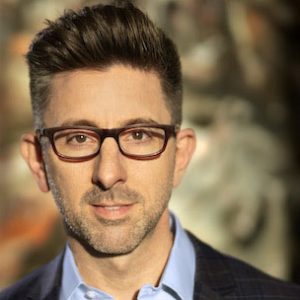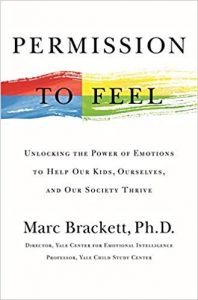Unit 7: Emotions and Language Learning
Activity 3: Emotional Intelligence
Part A: Main Idea Question
Reflection
Emotional intelligence is defined as: “the ability to monitor one’s own and others’ feelings, to discriminate among them, and to use this information to guide one’s thinking and action.” (Salovey & Mayer, 1990; p.189). You will be reading an interview with a researcher about ways of becoming an emotion scientist.
What do you think it means to become an emotion scientist?
Discuss it in your groups.
Part B: Reading for Details
Read
Skim the interview, How to Become a Scientist of Your Own Emotions, and find the definition for an emotion scientist.
How to Become a Scientist of Your Own Emotions
A Q&A with researcher Marc Brackett about how to cultivate emotional intelligence in ourselves and our kids.
By Jill Suttie by September 16, 2019


A. Many of us get the message that our emotions are not OK. If we are angry, we are told to calm down; if we are sad, we are told to get over it. So, we end up repressing our emotions or pushing them away, making us feel inauthentic, unmotivated, depressed, or worse.
B. According to Marc Brackett, founder of Yale University’s Center for Emotional Intelligence and author of the new book Permission to Feel, this is a terrible mistake. Our emotions are important clues to how we are experiencing the world, helping us make decisions, build good relationships, fulfill our dreams, and cultivate well-being.
C. Brackett says we need to encourage more emotional expression—not less—and that we should teach emotion skills to people starting from a young age. To that end, he’s led the development of an emotion skills-building program called RULER that aims to increase children’s ability to recognize emotions in themselves and others, understand where their emotions come from, label emotions more precisely, express emotions in different contexts, and regulate (or manage) emotions more effectively. To date, RULER has been taught in nearly 2,000 schools across the United States, helping children improve their ability to learn, form relationships, and find success in life.
D. Brackett was inspired to do this work after he suffered from childhood bullying. His book charts his own personal story while providing a primer on the growing science of emotion and encouraging readers to work toward increasing their own emotional intelligence. I spoke to him recently about his book and its message.
Jill Suttie (JS): Why is emotional intelligence so important?
E. Mark Brackett (MB): We’ve done a lot of studies which show that emotional intelligence is predictive of really important life outcomes. People with higher emotional intelligence tend to have greater psychological health, are less anxious and less depressed or less burned out at work. They tend to make better decisions in life. They tend to have better-quality relationships, tend to perform better academically and in the workplace. So, I think the evidence is pretty clear that emotional intelligence, controlling for all other competing variables—like intelligence and personality traits—is a set of skills that really matter for people’s dreams to come true.
JS: In your book, you encourage people to be what you call an “emotion scientist” as opposed to an “emotion judge.” What do you mean by that?
F. MB: Many of us are closed off to our feelings and other people’s feelings. We often make very quick snap judgments about how people feel based on their facial expressions and their body language and their behavior. An emotion scientist is someone who asks really good questions to ensure that they understand their own feelings, as well as other people’s feelings. The emotion scientist is looking for themes and trying to understand what’s behind people’s behavior or inability to regulate emotions. In some ways, an emotion scientist is about becoming more precise. They ask themselves, Is this person feeling disappointment or anger? Am I hearing about unmet expectations or about unfairness? An emotion scientist can pick up on nuances based on the questions they ask, which helps them label feelings more accurately and in turn regulate more effectively.
JS: In your RULER program, why is labeling emotions so important?
G. MB: There’s an expression that people use in our circles: If you can name it, you can tame it. So, knowing that you’re feeling envious or jealous, and being clear about what underlies envy (wanting what someone else has) versus jealousy (feeling threatened about the possible loss of someone that you care about), is really critical for knowing the right pathway to take for helpful emotion regulation. The strategy that I would use to support a child feeling envy versus jealousy would be very different.
H. I give an example in my book from my own childhood. After coming home from my karate test where I had failed to get my yellow belt, I started screaming and yelling at my mother. She told me, “Stop being so angry, go to your room, and wait ’til your father gets home.” But what she didn’t know was the underlying story, which was that when I was getting ready to come home after failing the test, I wasn’t just disappointed by my failure, but I was also made fun of in the locker room by some kids who were the bullies at school. They were threatening me and making me feel bad about myself. So, I was really feeling a combination of fear and shame, but I looked like I was angry because I was yelling and screaming.
What I really needed was comfort, someone to help me restructure my negative thinking, more practice, and maybe even some support on my way to school the next day, because the bullies threatened to beat me up. Instead, I was punished and told to calm down. So, until you really know the feeling, it’s going to be super hard to know how to help your child.
JS: How is “emotion regulation” distinct from “emotional repression”?
I. MB: Well, repression is a form of regulation, but we would say it’s generally unhelpful. There are many strategies—like yelling, screaming, suppressing, repressing, blaming, excessive drug use and alcohol consumption, denial—that people use, but that are not the most helpful for achieving goals and health and well-being.
Then there are the helpful strategies—the ones that we have to learn in order to replace these unhelpful ones: positive self-talk, cognitive reappraisal, getting social support we need from people who care for us and that we care about. A big part of teaching emotion regulation is helping people to evaluate the helpfulness or unhelpfulness of the strategies they’re currently using and then teaching them to replace those unhelpful ones with helpful ones. Helpful strategies have to be learned, practiced, and refined over time.
JS: How do you know that your approach is culturally sensitive and relevant to kids from different socioeconomic, cultural, and racial backgrounds?
J. MB: What’s critical about the way we teach these skills to children is that there is no correct or incorrect strategy. We’re never trying to tell a kid that there is only one good way to regulate their feelings. We try to help kids explore and discover the strategies that work best for them based on their background, their personalities, and their family context. In that way, there’s never judgment around something being the best strategy. It’s really helping the child find what works best for them.
I’ll give you an example. I was in a school in Seattle that serves children from 57 different cultures. And there was a kindergarten class where a lot of the kids said that they felt like getting a hug would be a good strategy when they were feeling sad. But there was one little girl in the class who was from the Middle East, and getting a hug was not something she could accept because of her religion. So, we were able to teach that hugs are helpful for some people and not for other people, and that there are many strategies people can choose to manage their sadness. What’s nice is that, from an early age, kids see that there are both individual and cultural differences in what people need. As long as the strategy is helpful for supporting the child with their emotional needs, that’s what matters.
JS: What impact do you hope your book will have?
K. MB: I wrote the book because I believe this information is valuable for everyone. While our approach to social and emotional learning, RULER, is scaling up—this year we trained 500 schools—there are still tens of thousands of schools and hundreds of millions of people across the United States, not to mention other countries, that would not have access to what I believe is really important information. So, my hope is that my book will reach as many people as possible and help them learn how to become emotion scientists. That way, they can be healthier and happier; better parents, partners, and colleagues; and engaged citizens who can make the world a better place.
Part C: Match the Terms
Matching
Match the following headings with the correct paragraph from the first section (first 4 paragraphs) of the article How to Become a Scientist of Your Own Emotions. Each paragraph is labeled with a letter and the possible options for this matching exercise are available in the collapsible element above and in the full article on this page.
